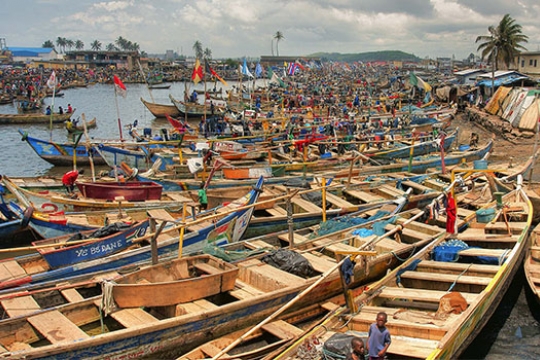A subsidy scheme for Ghana’s artisanal marine fisheries sub-sector is bleeding the national purse and depleting small pelagic fish stocks, while hurting targeted beneficiaries. How is this, and what better ways forward? Subsidy on premix fuel, which is a fishing capacity-enhancing subsidy, was the focus of a webinar convened by Prof. Wisdom Akpalu (the Director of ENRRI) on 16 September 2020.
Building on the momentum of recent fisheries sector activities and engagements, the webinar on the topic “Saving the sea from drying” brought together decision makers and other stakeholders to discuss the problem and provide new inputs into the debate on Ghana’s premix fuel subsidy.
The irony of an expensive subsidy with poor returns
In a presentation that highlighted several other fisheries sector ills, it was revealed that far from improving the fortunes of artisanal fishers, the premix fuel subsidy is plagued by endemic corrupt practices, and rather largely benefits individuals who are not working in fisheries sectors.
The expenditure on premix fuel subsidy alone is more than the sector ministry’s (Ministry of Food and Agriculture, MOFAD) annual total budget allocation. As at 2016, for example, the premix subsidy (which was about GHS150 million) was more than twice MoFAD’s annual total budget.
But the cost of the premix fuel subsidy goes beyond the financial. Regarding marine resources, it was noted that by lowering the cost of fishing expedition, the subsidy contributes to increasing the number of fishing trips and average trip-duration, thus accelerating the depletion of the fishery resources. Artisanal fishers are adversely impacted, disproportionately so, as are sustainable fishing goals.
A better way
Participants agreed that there is an urgent need to redirect the premix fuel subsidy to other priority areas (like education, for example) that would be more beneficial to the fishers. Re-directing the premix fuel subsidy will lead to a reduction in the number of canoes and promote sustainable management of targeted fish stocks.
Coming on the back of a successful face-to-face seminar on fisheries management in Ghana, the webinar provided opportunity for ENRRI to engage with regional and international experts, thereby learning from best practices to inform local decision making.
